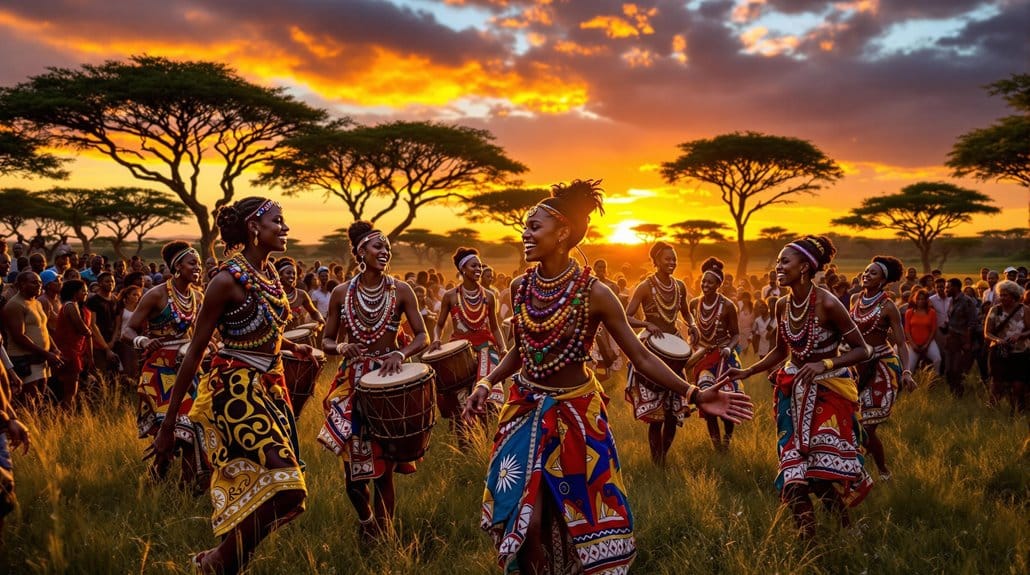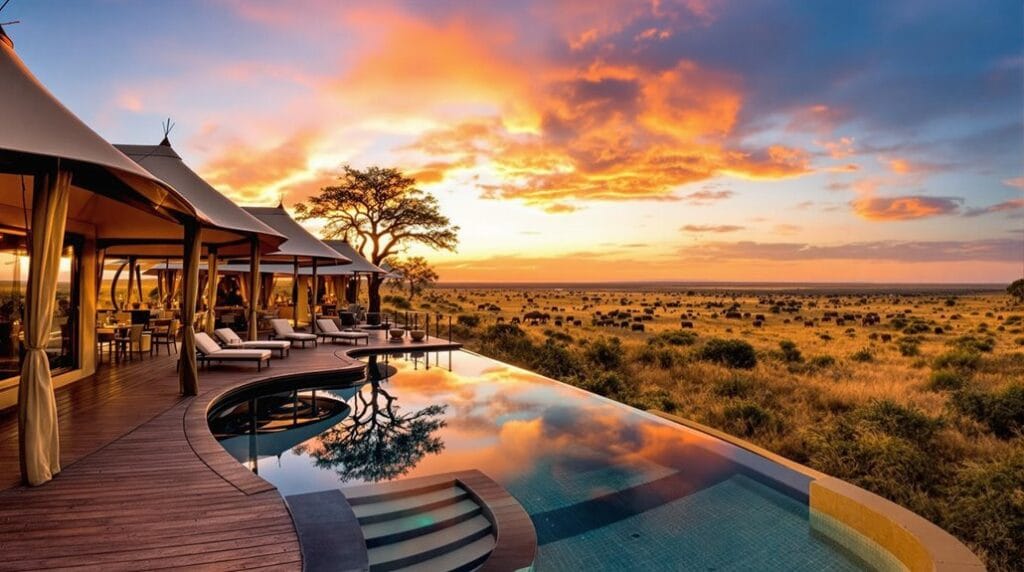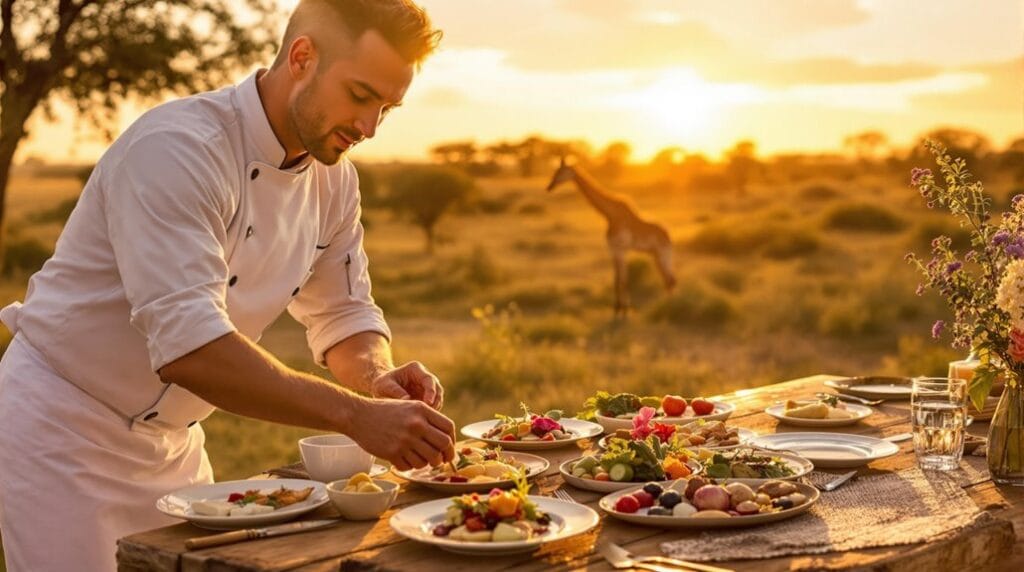Exploring Africa's rich celebrations, you'll discover a vibrant tapestry of traditions that highlight community, cultural identity, and spiritual beliefs. Festivals reflect the continent's diversity, hosting over 3,000 ethnic groups and showcasing unique rituals tied to agricultural cycles. Events like the Timkat Festival in Ethiopia and the Mawazine Festival in Morocco draw crowds with music, art, and culinary delights. Such celebrations not only strengthen communal ties but also promote environmental stewardship and heritage preservation. You'll find that each festival offers a unique insight into Africa's cultural wealth, and there's so much more to uncover about these fascinating traditions.
Key Takeaways
- African festivals celebrate diverse traditions and community connections, reflecting over 3,000 ethnic groups and their unique cultural practices.
- Many festivals, like Timkat in Ethiopia, commemorate significant spiritual events and strengthen community bonds through rituals and vibrant processions.
- Culinary traditions play a crucial role in festivals, symbolizing abundance and fostering community spirit through shared meals and local delicacies.
- Festivals promote environmental sustainability and awareness, connecting cultural practices with conservation efforts, as seen in the Hermanus Whale Festival.
- These celebrations significantly boost local economies and tourism, while also preserving heritage and promoting indigenous languages and arts amidst modernization.
Overview of African Festivals
Celebrating Africa's rich cultural heritage through festivals is a vibrant expression of its diverse traditions and communities. With over 3,000 ethnic groups and 2,000 languages, African festivals showcase a unique event for every season, resonating with the continent's cultural diversity.
From the rhythmic beats of a music festival to the sacred rites of traditional practices, each celebration invites you into a world of stories, heritage, and connection.
Festivals like the Timkat Festival in Ethiopia and the Ouidah Voodoo Festival in Benin highlight the deep cultural significance of religious observances, fostering community engagement and belonging.
You'll find the National Arts Festival in South Africa and the Harare International Festival of the Arts promoting local arts and cuisine, drawing both locals and international visitors alike.
Moreover, environmental awareness plays an essential role in events such as the Hermanus Whale Festival in South Africa, where sustainability and local talent shine.
As you immerse yourself in these diverse cultures, you realize that African festivals aren't just celebrations; they embody a rich cultural heritage that binds communities and invites you to partake in a shared experience of joy and unity.
Major Cultural Festivals
Experience the dynamic tapestry of Africa's major cultural festivals, where each event serves as a vibrant showcase of the continent's artistic diversity and heritage. These celebrations not only highlight the rich culture of Africa but also foster a sense of belonging and community.
| Festival Name | Location | Highlight |
|---|---|---|
| National Arts Festival | Grahamstown, South Africa | Over 600 acts across disciplines |
| Harare International Festival of the Arts | Zimbabwe | 1,000 performances in various arts |
| Timkat Festival | Ethiopia | Colorful processions and rituals |
Each cultural event brings together local and international artists, emphasizing the unique African performing arts. For instance, the Cape Town International Jazz Festival showcases a mix of local talent and global stars, while the Lake of Stars Festival invites you to experience music and arts by the stunning shores of Lake Malawi. Such festivals in Africa are not just entertainment; they're essential gatherings that celebrate heritage, promote tourism, and create lasting connections across communities. Engaging in these rich celebrations can deepen your appreciation for Africa's diverse cultural landscape.
Music Festivals
Music festivals in Africa pulse with energy and creativity, drawing millions to vibrant gatherings that showcase the continent's rich musical heritage. Each festival offers a unique celebration, reflecting the diverse cultures and sounds that define the African experience.
For instance, the Cape Town International Jazz Festival attracts around 34,000 attendees annually, featuring over 40 local and international artists, as well as workshops that enhance understanding and appreciation of jazz.
Similarly, Sauti za Busara in Zanzibar highlights East African music, presenting performances that foster cultural exchange and connect the diaspora with their roots.
The Afrochella Festival in Ghana takes this a step further, blending live music with art and culinary experiences that celebrate African heritage every December.
In Morocco, the Mawazine Festival captivates over 2 million visitors, showcasing a multitude of musical genres across various stages.
The Gnaoua World Music Festival further enriches this cultural tapestry, drawing over 300,000 attendees to experience performances steeped in tradition.
Together, these festivals create a sense of belonging, inviting you to immerse yourself in the rhythms, stories, and vibrant expressions of African cultures.
Traditional and Religious Festivals
When you explore Africa's traditional and religious festivals, you uncover the vibrant rituals that define cultural identities and foster community connections.
Events like the Timkat Festival and the Umhlanga Reed Dance aren't just celebrations; they're profound expressions of heritage and collective values.
As you witness these gatherings, you'll see how they strengthen bonds among participants, creating a sense of belonging and pride.
Cultural Significance of Rituals
Rituals embedded in traditional and religious festivals across Africa bring communities together, showcasing their rich cultural heritage. These festivals are more than mere celebrations; they're crucial expressions of identity, weaving together music, dance, and rituals that resonate with the values of various communities.
For instance, Timkat in Ethiopia not only commemorates the baptism of Jesus but also reinforces community bonds and spiritual identity through grand processions filled with vibrant colors and shared joy.
Similarly, the Gerewol Festival in Chad highlights the enduring beauty of Wodaabe culture, where young men engage in traditional beauty pageants, reflecting cultural ideals through elaborate adornments. Here, storytelling plays a significant role, as rituals preserve historical narratives, teaching younger generations about their ancestors' traditions and values.
Religious festivals like Moulid El Nabi in Egypt further blend spiritual observance with cultural celebration, fostering unity among participants.
Through these celebrations, you can feel the pulse of a community, each ritual steeped in meaning, echoing the collective spirit. In every dance, song, and shared moment, the essence of belonging thrives, reminding everyone of the cultural tapestry that binds them together.
Community Bonding Through Celebrations
Celebrations in Africa pulse with life, drawing communities together in vibrant displays of unity and shared identity. These cultural festivals serve as essential expressions of community bonding, where shared rituals foster social cohesion.
Events like the Timkat Festival in Ethiopia not only commemorate significant moments, such as the baptism of Jesus, but also attract thousands, reinforcing communal ties and cultural identity.
Similarly, the Ouidah Voodoo Festival in Benin honors traditional beliefs while celebrating the diverse communities that participate, weaving their heritage into a rich tapestry of ceremonies and communal feasting.
The Festival of the Dancing Masks in Burkina Faso highlights storytelling through dance, allowing you to connect with your history and strengthen social bonds with fellow participants.
Religious celebrations, such as the Meskel Festival in Ethiopia, unite communities in joy and reflection, offering a platform for shared beliefs and collective remembrance of significant cultural narratives.
Through these festivals, you can experience the essence of community bonding, as they create spaces where cultural identity flourishes, and diverse communities come together to celebrate their heritage with pride.
Coastal and Nature Festivals
When you think of coastal and nature festivals in Africa, vibrant marine wildlife celebrations and tantalizing culinary experiences come to mind.
Events like the Hermanus Whale Festival invite you to connect with nature while enjoying local flavors, showcasing the region's rich biodiversity.
Meanwhile, festivals such as the Knysna Oyster Festival immerse you in the coastal culture, blending the joy of food with community spirit.
Marine Wildlife Celebrations
Across the vibrant coasts of Africa, a variety of marine wildlife festivals beckon visitors to engage with the rich biodiversity of the region. These celebrations offer more than just entertainment; they cultivate a deep sense of community spirit and environmental awareness. The Hermanus Whale Festival stands out as a premier event, attracting around 100,000 visitors annually. You'll find engaging family activities focused on marine conservation, alongside enchanting performances and local delicacies.
In Kenya, the Mombasa Carnival dazzles with its vibrant floats and costumes, showcasing the coastal culture while fostering a sense of belonging among participants. Each festival not only entertains but educates attendees about the importance of protecting marine ecosystems.
Here's a brief overview of notable marine wildlife celebrations:
| Festival | Location |
|---|---|
| Hermanus Whale Festival | South Africa |
| Mombasa Carnival | Kenya |
| Knysna Oyster Festival | South Africa |
| Lake of Stars Festival | Malawi |
| Marine ECO Village | Hermanus, South Africa |
These festivals create memorable cultural experiences that unite communities and raise awareness about wildlife conservation. Join in the celebration and be part of the movement to protect our oceans!
Culinary Coastal Experiences
Exploring Africa's coastal regions reveals a delectable fusion of flavors and traditions that reflect the vibrant cultures surrounding them. Festivals like the Knysna Oyster Festival in South Africa celebrate local delicacies with exciting food activities such as oyster shucking competitions, drawing families and food enthusiasts into a shared experience.
Similarly, the Mombasa Carnival in Kenya showcases vibrant floats and costumes while offering fresh coconut milk and Mnazi, culminating in a lively boat regatta at Fort Jesus beach that captivates the community.
The Hermanus Whale Festival combines environmental awareness with local cuisine, creating an inviting atmosphere that attracts around 100,000 visitors each year.
At Lake of Stars Festival in Malawi, you'll find music and culinary experiences merging seamlessly on the shores of Lake Malawi, promoting tourism and community engagement.
Finally, the Afrochella Festival in Ghana showcases rich African cuisine alongside live performances, wrapping you in a warm embrace of local traditions.
These culinary coastal experiences not only celebrate the unique flavors of each region but also foster a sense of belonging, inviting you into the heart of Africa's diverse cultures.
Arts and Cultural Celebrations
Africa's vibrant arts and cultural celebrations offer a rich tapestry of experiences that showcase the continent's diverse heritage and creativity. These festivals not only highlight local talent but also foster a sense of belonging among attendees, drawing people from various backgrounds to connect through the arts.
- National Arts Festival in South Africa: Africa's largest cultural event with over 600 performances.
- Harare International Festival of the Arts: A melting pot of music, dance, and poetry promoting Zimbabwean culture.
- Sauti za Busara in Zanzibar: A celebration of East African music and cultural exchange.
Each of these festivals serves as a dynamic platform for artists to express their identities and share their stories. At the National Arts Festival, you'll witness a thrilling array of drama, music, and comedy that reflects South Africa's rich cultural landscape.
Meanwhile, the Harare International Festival of the Arts invites you to experience Zimbabwe's vibrant creative scene through thousands of performances.
From sacred music in Morocco at the Fes Festival to the diverse genres celebrated at the Maitisong Festival in Botswana, Africa's arts and cultural celebrations truly embody the spirit of unity and diversity.
Immerse yourself and experience the heartbeat of African culture!
Unique Cultural Experiences
In the heart of Africa, unique cultural experiences unfold that vividly illustrate the continent's rich traditions and communal bonds.
Festivals in the world, like the Gerewol Festival in Chad, showcase the Wodaabe people's extraordinary beauty pageantry. Here, young men impress female judges with intricate face paint and traditional dance, celebrating their cultural identity.
Similarly, the Bianou Festival in Niger brings together the Tuareg people in vibrant processions, where indigo boubous and turbans symbolize unity and belonging.
In Ethiopia, Timkat embodies deep spiritual traditions, with grand processions and mass baptisms that strengthen community ties.
The Ngoma Festival in Uganda further fosters communal bonding through music and dance, allowing locals to showcase their artistic expressions.
Meanwhile, Togo's Fire Dancing ritual highlights cultural resilience, as Ewe villagers connect with their ancestors through awe-inspiring feats of endurance.
These exceptional events weave a rich tapestry of African cultures, inviting you to immerse yourself in the essence of each celebration.
As you participate, you'll not only witness unique traditions but also feel the powerful sense of belonging that unites these diverse communities across the continent.
Environmental and Eco-Tourism Festivals
Festivals across Africa not only celebrate rich cultural traditions but also highlight the growing importance of environmental awareness and sustainable practices. These events draw people together, fostering a sense of belonging while promoting the beauty and diversity of Africa's natural world.
Consider these remarkable eco-tourism festivals:
- Hermanus Whale Festival: Celebrating the Southern Right Whales' migration, this family-friendly event attracts around 100,000 visitors while focusing on conservation.
- Aouk National Park: This eco-tourism hotspot in Chad emphasizes wildlife experiences and the preservation of natural habitats.
- Beneath the Baobabs Festival: In Kenya, this festival raises awareness about sustainability through diverse music genres, promoting responsible tourism.
These festivities not only entertain but also educate attendees about the importance of conservation. By participating, you're not just enjoying cultural displays; you're embracing a movement towards sustainable practices and environmental stewardship.
Events like the Lake Malawi Festival and the Donia Nosy Be Festival further showcase the harmony between culture and conservation.
You'll find that through these celebrations, you can connect with the land and its people, fostering a deeper appreciation for Africa's rich wildlife and natural heritage.
Culinary Festivals
There's something magical about the culinary festivals that pop up across the continent, drawing food lovers and cultural enthusiasts alike.
In South Africa, for instance, the Knysna Oyster Festival captivates visitors with its ten-day celebration of oysters, featuring lively oyster shucking competitions and enticing food tours. You'll find yourself immersed in a festive atmosphere, discovering local delicacies that showcase the region's rich maritime culture.
Meanwhile, Kenya's Mombasa Carnival blends vibrant floats and music with mouthwatering dishes like fresh coconut milk and Mnazi, inviting you to explore the heart of African culture.
Afrochella in Ghana takes it a step further, celebrating traditional dishes through food stalls that highlight both classic and innovative culinary experiences.
In Malawi, the Lake of Stars Festival harmonizes music with culinary delights, showcasing local food vendors and their traditional dishes along the scenic shores of Lake Malawi.
Each of these culinary festivals embodies a unique slice of Africa's diverse culinary scene, creating connections through shared tastes and experiences.
You'll leave not just with a full belly but with a deeper understanding of the continent's rich cultural tapestry.
Frequently Asked Questions
What Are the African Celebrations?
When you think about African celebrations, you'll find a vibrant tapestry of cultural festivals, traditional ceremonies, and harvest celebrations.
These events bring communities together through music events, dance rituals, and spirited gatherings.
You'll witness religious observances and ancestral rites that honor heritage and foster unity.
Each celebration reflects a unique blend of history and tradition, inviting you to experience the richness of Africa's cultural diversity and the sense of belonging it creates.
What Is the Importance of Celebrating Africa Day?
Celebrating Africa Day might seem like just another holiday, but its importance runs deep.
It's a powerful reminder of unity in diversity, fostering social cohesion and identity affirmation among nations. By reflecting on historical achievements, you promote regional collaboration and peace, while empowering economies.
Engaging with Africa's rich cultural heritage, you connect with your roots and others, strengthening the bond that ties communities together.
It's a day to embrace the continent's vibrancy and resilience.
What Is the Importance of African Tradition?
African tradition's importance lies in its role as a living tapestry of cultural heritage. It fosters community bonding and social cohesion, bringing people together through shared practices.
Spiritual connection is woven into daily life, while oral traditions pass down intergenerational knowledge, enriching your identity expression.
These traditions instill moral values, guiding behavior and beliefs. By celebrating these rich legacies, you not only honor your roots but also strengthen the fabric of your community.
What Is the Significance of Africa?
Did you know Africa boasts over 3,000 ethnic groups, each with its own unique cultural heritage?
The significance of Africa lies in its rich community bonding, where historical roots intertwine with spiritual connections. Celebrations showcase artistic expressions that reinforce social identity and foster intergenerational knowledge.
These vibrant traditions also promote environmental awareness, reminding you of the deep ties between people and the land. Engaging with Africa's diversity can inspire a profound sense of belonging.
Conclusion
As you journey through Africa's vibrant celebrations, you'll discover more than just festivities; you'll unearth the soul of a continent rich in heritage and diversity. Each festival, whether pulsating with music or steeped in tradition, beckons you to experience the stories behind the colors and rhythms. Isn't it fascinating how these events weave together the past and present, inviting you to partake in a legacy that transcends time? Embrace the magic, and let Africa's spirit ignite your own.









